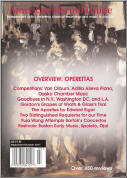Texte paru dans: / Appeared in: |
|
|
Outil de traduction ~ (Très approximatif) |
|
|
Reviewer: Catherine
Moore
This re-telling of the
familiar Orpheus and Euridice story is conceived “as a kind of opera in
miniature or as a cantata for two solo voices and chorus” by countertenor
Philippe Jaroussky, who sings the role of Orpheus. Excerpts from three
separate Orpheus operas by Claudio Monteverdi (first performed in Mantua,
1607), Luigi Rossi (Paris, 1647), and Antonio Sartorio (Venice, 1672) are
well selected and made into a very satisfying program. Whereas the three
composers emphasized different parts of the story (the happy couple, or the
descent to Hell, or the path homeward) this newly-created “opera” is able to
encompass them all in a cohesive and engaging whole. The musical styles
complement each other, and all the interpretations are very fine.
We all know the story’s
extreme contrasts of elation and despair, life and death, happiness and
damnation, resolve and weakness. Large musical forces supply plenty of
theatrical variety for director Diego Fasolis to muster: there are 24
singers in the chorus and 31 players in the I Barocchisti ensemble. As a
result, instrumental ritornelli are full and dramatic; tip-toeing
instruments underscore the gentle persuasiveness of Euridice’s ghost as she
begs Orpheus to use his unfailing gift of song to gain permission to go to
Hades and rescue her; and the chorus ranges from vigorously asserting the
moral of the story to delicately singing a lullaby-like ode addressing
Euridice as “fair eyes” (“begl’ occhi”).
Instrumental sections and well
chosen percussion effects further support the drama and illustrate the
action. I found only one scene transition to be too abrupt: the one between
the lovers declaring blissful optimism and the death of Euridice by a snake
bite. Yes, there’s a thunderclap denoting her imminent death, but a somewhat
longer pause just before that and perhaps a couple of shorter drum beats
would amplify the transition’s effectiveness by making it a few seconds
longer.
Soprano Emoke Barath moves
effortlessly from Euridice’s carefree young love at the start of the story,
through her dreamlike state in the etherworld beyond death, to her final
(and futile) instruction to Orpheus that he not look back. Philippe
Jaroussky very eloquently meets the demands of his own transformations from
happy bridegroom, to grieving spouse, to persuader of the gods, to desolate
wretch. | |
|
|
|
|
Cliquez l'un ou l'autre
bouton pour découvrir bien d'autres critiques de CD |
|




